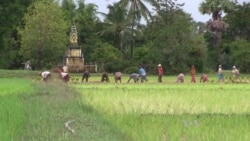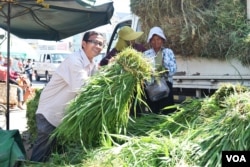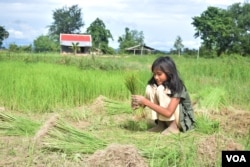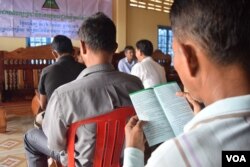The farmers of Domnak Sokrom commune were fed up with waiting.
They had spent more than a decade going back and forth with their CPP ((Cambodian People’s Party)) commune chief, who had promised them government funds would be available to build an irrigation support network, crucial in monsoonal Cambodia, where wet seasons are extreme and dry seasons can be equally as harsh on agricultural land.
Finally, the frustrated villagers from Cambodia’s Kampot province banded together, pooled their money and built an irrigation gate to help store and control the flow of water into thousands of hectares of rice fields.
“People agreed with each other that if we didn’t build it ourselves and waited for the government, we wouldn’t have it, because the commune chief said this water gate couldn’t be built using the commune’s budget,” said Ourn Sophal, president of a local farmers’ association and a local leader for the recently created Grassroots Democracy Party.
“People heard that we couldn’t use the [commune] budget, so they thought they’d better build it by themselves.”
It is this type of community spirit the Grassroots Democracy Party is seeking to harness.
The party’s members say they have lost faith in the country’s two dominant parties, and are seeking to turn Cambodia’s traditional “top down” politics on its head, empowering rural voters through political education and the development of policies through debate at the local level.
Top down politics
With Cambodia’s commune elections to be held next June, Prime Minister Hun Sen appears to have already kicked off the campaign for his Cambodian People’s Party, which has ruled with a strong arm for more than 30 years, with a nationwide provincial tour, boasting of improvements to roads, bridges and schools under his party’s watch.
The opposition Cambodia National Rescue Party, which made significant gains in the closely contested 2013 national election, has long held rallies in the countryside, with the party’s top brass traveling to rural areas, aiming to shore up votes for next year’s local elections, which are expected to act as a barometer for the national vote in 2018.
Yet the Cambodia National Rescue Party has come under fire from political analysts and minor parties recently for being more focused on the status of its leaders than developing public policy that would help it govern successfully at the local level. Party leader Sam Rainsy, who is self-exiled in France to avoid defamation charges, has chosen to publicly defend the party from being labeled a “one-man show.”
GDP founders say group decision-making is rare in the provincial areas, as village and commune chiefs are beholden to the rigid hierarchy of Cambodian politics that is directed by leaders in Phnom Penh.
Created just last year, the party is taking a long-term view, backing the spread of awareness from village to village, through “empowered” local leaders.
Demanding more from politics
Analysts say rural Cambodians are becoming increasingly engaged in politics.
Improved livelihoods and greater access to independent media via radio and smartphones in Cambodia’s rural areas means information is more readily available to people than ever before.
“When people have slightly more than enough, they can have some time to think about their situation: their future and their children's, their challenges, their government's roles,” said independent researcher Srey Chanthy. “They don't have to be concerned so much about if they have a plate of rice for tomorrow.”
With their children migrating to countries like South Korea, Japan, Thailand and Malaysia, many Cambodian farmers, with access to low-cost smartphones and social media, are learning about the political climate in other countries and demanding more from their leaders at home, he added.
Many GDP members are judging politicians on the promises made following the 2013 election.
“I have only seen changes in the garment worker’s wages,” said Doung Pov, a 53-year-old farmer from Takeo province, attributing the salary increase to pressure applied by the opposition.
“I haven’t seen any other noticeable changes,” she said, echoing the concerns of dozens of converts attending GDP meetings in Takeo and Kampot provinces earlier this month.
Bottom up politics
Starting in provinces close to the capital, GDP founders are meeting with voters who, they say, have become disenchanted with Cambodia’s centralized power structures. Party organizers are providing a platform for people to debate party policies, from local economics with a focus on agriculture, to health and education and even foreign relations.
“In short, our policy is focused on rural development from the grassroots, and decentralization to make sure that each person at the commune level has enough capacity to solve their own problems, and the freedom and resources to solve problems for themselves,” said GDP co-founder Yaing Saing Koma.
The party has just 2,000 members and is aiming to win outright in 20 of 1,600 communes in 2017, but it expects to have elected councilors in 80 other communes. It is holding forums in more than 200 villages across nine provinces, where it establishes a local platform before bringing in new members.
Koma concedes his party’s bottom up approach to local policy development and intra-party leadership contests will become unwieldy as membership expands, but is confident its 20-year vision will foster a more politically confident electorate.
A history marked with violence
But going against the grain is dangerous in a country whose political history is marked with violence.
In July, prominent political analyst Kem Ley, whose research contributed to the formation of the GDP, was killed while drinking his regular morning coffee at a gas station café in Phnom Penh.
A suspect has been arrested and the investigation is ongoing, but the assassination has the hallmarks of political killings of the past, like the murders of union leader Chea Vichea, who was gunned down in the street while reading a newspaper in 2004, and prominent environmental activist Chut Wutty, who was shot dead in 2012 while investigating illegal logging.
Friction has also emerged in village life in just the short time the GDP has been active.
A former CPP village chief from Kampot, Keat Long, says he was demoted by the Mean Rith commune chief and had his salary suspended after his son joined the GDP.
“My son knows what is right and what is wrong. And he is going to the right way. I don’t know why I should prevent him for doing this?” he said.
The 72-year-old said that farmers in the area have been drawn to community projects leveraged by the GDP, which, in turn, sparked their interest in policy debate.
Mean Rith commune chief Oeum Tan told VOA that Long had his pay cut as he is “illiterate” and “disorganized”.
“Keat Long is old and doesn’t have the power to control his son,” he said.
Self-reliance growing in rural Cambodia
Regardless of how people vote in the commune elections next year, many voters in Cambodia’s countryside are taking matters into their own hands.
“If we lack water we need to find it by ourselves,” said Sok Channa, a Takeo farmer, who said she had not heard of the GDP, but had little time for mainstream political parties.
Eying the construction of a community built dam in the neighboring village, where people there had also grown tired of waiting for government funding, Channa said her village was preparing to do the same.
“They [local authorities] said they can’t provide [irrigation] for us, so if we have enough money, we will build it ourselves.”











